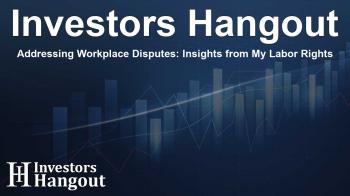Addressing Workplace Disputes: Insights from My Labor Rights

Insight into Workplace Disputes
Recent research reveals a troubling escalation in workplace challenges affecting employees throughout various sectors. My Labor Rights conducted a detailed study indicating increased workplace disputes, particularly in areas such as discrimination, retaliation, and wage violations. These findings shed light on the experiences of workers striving for equitable conditions and fair treatment in their professions.
Discrimination in the Workplace
Discrimination remains a significant issue for many employees. Data shows a persistent rise in claims associated with racial, gender, and disability discrimination. Workers frequently express feelings of marginalization or perceive unfair penalties based on factors unrelated to their performance. Discrimination can manifest through various forms, including denied promotions, unequal pay for similar work, and hostile behaviors from colleagues or supervisors.
Key Discriminatory Practices
Unequal Pay: Some employees raise concerns about receiving lower wages compared to colleagues performing similar tasks. This wage disparity leaves many feeling undervalued and demotivated.
Limited Advancement Opportunities: Employees with equivalent qualifications may notice distinctions in career progression, fueling discontent and perceived inequity.
Anti-Workplace Culture: Incidents such as workplace bullying or sexist jokes contribute to toxic environments, making daily responsibilities more challenging for those affected.
Retaliation and Its Consequences
The rise in retaliation claims presents additional challenges for employees. Reports indicate that when individuals speak out about issues such as wage theft or safety violations, they may face retaliation in the form of job loss, demotion, or negative performance reviews. This climate of fear can deter others from voicing their concerns, which allows unfair practices to persist unchecked.
Forms of Retaliation
Job Loss or Demotion: Workers often fear losing their employment status for reporting grievances, undermining confidence in internal reporting processes.
Increased Harassment: Following complaints, employees may encounter escalated hostility or unwarranted changes in duties, which creates an overwhelming atmosphere of anxiety.
Unfounded Performance Evaluations: When evaluations become biased against those raising workplace issues, it jeopardizes their opportunities for promotions and career growth.
Challenges with Wage and Hour Violations
Wage disputes remain persistent, with many employees experiencing violations of California's comprehensive wage laws. Issues like unpaid overtime, lack of mandated breaks, and misclassification can greatly impact workers' livelihoods.
Major Wage Issues
Unpaid Overtime: Employees who work over the standard hours often report not receiving the extra pay they are entitled to.
Misclassification Issues: Companies sometimes misclassify employees as independent contractors, thereby depriving them of essential benefits like healthcare and job security.
Meal and Rest Break Violations: Many workers face pressure to skip breaks, leading to burnout and health-related concerns.
The Broader Economic Impact
Workplace disputes harm not only individual employees but also have larger economic repercussions. When employees face wage theft or discrimination, it contributes to lower consumer spending, which can contract economic growth within communities. Additionally, organizations that fail to address legal violations may suffer reputational harm and financial penalties, proving that fostering a fair work environment is crucial for employee morale and organizational success.
Promoting a Healthy Workplace Culture
To combat these ongoing issues, businesses can benefit from adopting educational initiatives around labor laws and employee rights. Establishing proactive policies and conducting regular training helps to reduce disputes and fosters a culture of transparency. Encouraging an open dialogue about workplace issues ensures employees feel secure in expressing their concerns.
Resources for Employees
Employees are encouraged to utilize available resources that guide them in understanding their rights. Organizations that specialize in employee advocacy can offer support in navigating difficult workplace situations. By doing so, individuals can better protect themselves against unfair treatment and contribute to creating a healthier workplace.
About My Labor Rights
My Labor Rights is a committed legal service that advocates for employees facing unfair treatment at work. Their mission is to provide support in a variety of cases, including discrimination, wage disputes, and retaliation. By focusing on equitable labor practices, My Labor Rights aims to improve workplace environments across various industries.
Frequently Asked Questions
What types of workplace discrimination are most common?
Common forms of workplace discrimination include race, gender, and disability-based discrimination, often manifesting in unequal pay and limited advancement opportunities.
How can employees report workplace violations?
Employees can report workplace violations to relevant state departments or seek assistance from organizations that specialize in employee rights.
What should I do if I'm experiencing retaliation?
If you experience retaliation, document incidents and report them to human resources or seek legal advice for support in addressing these issues.
Are there resources for legal support regarding labor rights?
Yes, various organizations provide guidance and legal support for employees facing workplace challenges, including advocacy groups and legal services.
How can employers foster a better workplace environment?
Employers can promote better environments by investing in training programs, implementing clear complaint processes, and encouraging open communication among employees.
About The Author
Contact Caleb Price privately here. Or send an email with ATTN: Caleb Price as the subject to contact@investorshangout.com.
About Investors Hangout
Investors Hangout is a leading online stock forum for financial discussion and learning, offering a wide range of free tools and resources. It draws in traders of all levels, who exchange market knowledge, investigate trading tactics, and keep an eye on industry developments in real time. Featuring financial articles, stock message boards, quotes, charts, company profiles, and live news updates. Through cooperative learning and a wealth of informational resources, it helps users from novices creating their first portfolios to experts honing their techniques. Join Investors Hangout today: https://investorshangout.com/
The content of this article is based on factual, publicly available information and does not represent legal, financial, or investment advice. Investors Hangout does not offer financial advice, and the author is not a licensed financial advisor. Consult a qualified advisor before making any financial or investment decisions based on this article. This article should not be considered advice to purchase, sell, or hold any securities or other investments. If any of the material provided here is inaccurate, please contact us for corrections.

